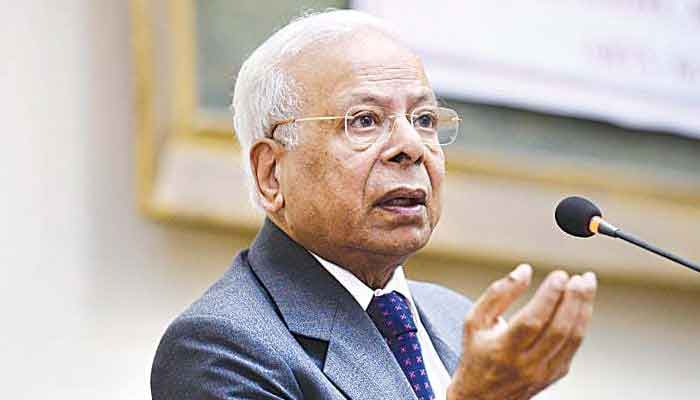To prepare bureaucracy for new challenges: Govt mulling over creating National Executive Service
The purpose of creating a NES is to identify, develop and place the best talent in policy-making positions
ISLAMABAD: The government is considering creation of a National Executive Service as an All Pakistan Service to draw a large pool of talent from within the whole range of civil services through an open, transparent competitive process.
A draft prepared by the Task Force on Civil Service Reform envisages that through regional representation and provincial quota, the proposed system will also ensure that the smaller provinces have a sense of participation in the top-level decision-making.
The draft proposes NES specialisation in four streams to equip the members of the cadre with skills and knowledge required to analyse the complex issues of economy and society and formulate appropriate strategies and policies.
It also promises fast track promotion prospects and attractive compensation package to provide incentives for better performance, high quality output and minimise corruption and rent seeking.
According to the draft, the purpose of creating a NES is to identify, develop and place the best talent in policy-making positions by drawing the entire pool of civil servants and other talent from the entire country irrespective of their original cadre, service or affiliation.
There will be no barriers to entry in NES either for any group or cadre of the civil servants or to any suitable professionals from outside the civil services. The only stipulation is that the candidates should meet the pre-specified eligibility criteria and then cross the hurdle of a competitive process open to all.
“The objectives of good governance emphasise responsiveness to the complex problems faced by the public and place persistent demands on the capacity and intellectual endowments of policymakers in the government,” the draft paper for NES said, adding, “Furthermore, the jobs in public sector require highly specialised skills in economics, social development, technical professions, regulation and human resource management. The selectees for the high-level jobs have to prove that they possess a mixture of substantive knowledge and skills combined with leadership traits.” It added that the future knowledge-based economy can be effectively managed by individuals who are able to demonstrate, display and practice these attributes.
It reminded that the proposal for the NES was placed before the Task Force on Civil Services Reforms in 2019, which was of the view that in the first instance, reforms in training, performance appraisal, promotion policy, and retirement rules may be undertaken.
The reforms, the draft paper said, would enable the competitive process for NES to make the selection for NES more effective and objective. As the decisions have now been taken on the reforms of training, performance appraisal, promotion policy, retirement rules, the proposal is being resubmitted to the members of the Task Forces on Civil Services Reforms and the Implementation Committee on Reorganising the federal government for their review and comments.
It is said that the present mode of the superior civil services that attract young men and women through an open competitive examination and spend 30-35 years serving the government had worked reasonably well in the first few decades after independence. The challenges of the 21st century for public service have become more complex. At the same time, the Superior Services are no longer attracting the best talent at the time of entry.
It added, both the numbers of candidates appearing at the examinations and the quality are on a downward slope. There is a general dissatisfaction among the citizens on the responsiveness of the civil servants in the delivery of basic public goods and services.
“Although a more broad-based programme of reforms in the judiciary and local government would address some of these issues in a holistic manner the current role, responsibilities and incentives of the civil servants require rethinking and redesign. Majority of the civil servants are also not satisfied with their working environment – poor compensation, political interference, fear of NAB, the media and judiciary, frequent postings and transfers and a general feeling of insecurity and absence of support from the Government,” it added.
Therefore, the draft paper said, this model of assured career path on the basis of an entry examination at a young age is no longer applicable or sustainable any longer. A new hybrid model, which nurtures, promotes and draws the expertise and domain knowledge and combines it with the broad-based experience, leadership traits and the ability to synthesise different perspectives and policy inputs is, therefore, proposed as the way forward. Leadership traits are not exclusively located within any one group but can be found across the groups too. There are examples in Pakistan where a medical doctor has managed a tertiary hospital and medical college in a highly effective and efficient manner and an engineer has successfully led Wapda. The same organisation i.e. Wapda has also been successfully led by several illustrious officers belonging to the Civil Service of Pakistan. “The lessons from these examples lead us to infer that an amalgam of traits such as strategic leadership with execution capability, motivating human resources and managing finances prudently, and broad understanding of the larger context in which policy decisions are taken –internal and external –should form the core of the NES, burying the present adversarial binary—generalist vs specialist. NES would draw the skills and experiences of both the generalists as well as specialists who exhibit the above traits,” the document said.
Issues that needs to be decided as per the document include (1) Whether a NES should be created in addition to the existing All Pakistan Services and Federal Occupational Groups? (2) Should the NES consist of four specialised streams? (3) Should the NES be an All Pakistan Service sharing some posts in the Provincial Secretariats? (4) Is it advisable to delink the NES positions from the BPS grades and pay them monetised salaries in the MP scale? (5) Would the formation of NES raise the motivation, efficiency and productivity of the government at large or demotivate the occupational groups that would no longer be automatically entitled to occupy the posts under the NES? (6) Whether the existing incumbents of the posts in BPS 20-22 in the federal and provincial governments be given the opportunity to be absorbed in the NES or should they along with other eligible candidates be screened by the CSB (Central Selection Board) and HPSB (High Powered Selection Board) for induction?
-
 Gigi Hadid Talks About 'relieving Tension' Amid Having Hashimoto's Disease
Gigi Hadid Talks About 'relieving Tension' Amid Having Hashimoto's Disease -
 Sarah Ferguson Is 'persona Non Grata', Prince William Makes It Clear To Everyone
Sarah Ferguson Is 'persona Non Grata', Prince William Makes It Clear To Everyone -
 Northern Lights Alert On Valentine’s Day: How, Where & Best Time To Watch Auroras
Northern Lights Alert On Valentine’s Day: How, Where & Best Time To Watch Auroras -
 Dennis Quaid Reveals What Keeps His Marriage To Laura Savoie Healthy
Dennis Quaid Reveals What Keeps His Marriage To Laura Savoie Healthy -
 Mustafa Suleyman Says Microsoft Is Building Its Own AI Superintelligence
Mustafa Suleyman Says Microsoft Is Building Its Own AI Superintelligence -
 Jessica Alba, Cash Warren Finalize Divorce After 16 Years Of Marriage
Jessica Alba, Cash Warren Finalize Divorce After 16 Years Of Marriage -
 China’s AI Boom Takes Center Stage At Spring Festival One Year After DeepSeek Stirred The Industry
China’s AI Boom Takes Center Stage At Spring Festival One Year After DeepSeek Stirred The Industry -
 James Van Der Beek Called His Sixth Child Jeremiah 'healing For Us' Before His Death
James Van Der Beek Called His Sixth Child Jeremiah 'healing For Us' Before His Death -
 Elon Musk Vs Reid Hoffman: Epstein Files Fuel Public Spat Between Tech Billionaires
Elon Musk Vs Reid Hoffman: Epstein Files Fuel Public Spat Between Tech Billionaires -
 Gordon Ramsay Denies Victoria Beckham Got Handsy With Brooklyn At His Wedding
Gordon Ramsay Denies Victoria Beckham Got Handsy With Brooklyn At His Wedding -
 Gordon Ramsay Makes Unexpected Plea To Brooklyn As He Addresses Beckham Family Feud
Gordon Ramsay Makes Unexpected Plea To Brooklyn As He Addresses Beckham Family Feud -
 Prince Harry Warns Meghan Markle To 'step Back'
Prince Harry Warns Meghan Markle To 'step Back' -
 Selena Gomez Explains Why She Thought Lupus Was 'life-or-death'
Selena Gomez Explains Why She Thought Lupus Was 'life-or-death' -
 New Zealand Flood Crisis: State Of Emergency Declared As North Island Braces For More Storms
New Zealand Flood Crisis: State Of Emergency Declared As North Island Braces For More Storms -
 Nancy Guthrie Case: Mystery Deepens As Unknown DNA Found At Property
Nancy Guthrie Case: Mystery Deepens As Unknown DNA Found At Property -
 James Van Der Beek's Brother Breaks Silence On Actor's Tragic Death
James Van Der Beek's Brother Breaks Silence On Actor's Tragic Death




